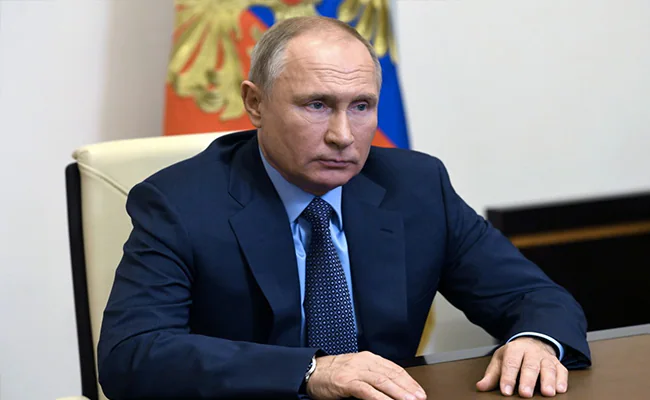Stop the war in Ukraine before it is too late
Last week, the media reported an alleged attempted attack on the Kremlin, the official seat of Russia’s government where President Vladimir Putin along with several ranking officials reside. The attack involving two unmanned aerial vehicles (UAV) popularly known as drones led to speculations as to the motive of the perpetrators of the act. Following the […]

Russian President, Vladimir Putin
Last week, the media reported an alleged attempted attack on the Kremlin, the official seat of Russia’s government where President Vladimir Putin along with several ranking officials reside. The attack involving two unmanned aerial vehicles (UAV) popularly known as drones led to speculations as to the motive of the perpetrators of the act.
Following the alleged incident, the Russian Presidential Press Service issued a statement, saying that “Timely action by the military and special services involving radar systems enabled them to disable the devices.’’
The statement further claimed that the attack was “a planned terrorist attack and an assassination attempt targeting the president, carried out ahead of Victory Day and the May 9, Parade, where foreign guests are expected to be present.’’
This comes against the background of the dangerous stalemate in the ongoing Russia-Ukraine war, now in its second year. Since the invasion of Ukraine by Russia, in what the latter dubbed as a “special military operation,” the war has degenerated into a brutal stage in which thousands have been killed, many of them civilians and whole cities destroyed, especially on the Ukrainian side.
The world has not been spared of the effects of this senseless war either. Because it is a war involving two major producers and exporters of primary products and industrial powers to boot, the effect of the inevitable disruption in the supply chain of their products and commodities caused by the war has been felt worldwide. Thus, economies around the world have been negatively affected by scarcity and rising prices of oil and gas, wheat, fertilizers and industrial machinery for which the two countries are known as major producers.
But from the start, the Ukrainian crisis had pitched Russia and its handful of cautious supporters against the American-led North Atlantic Treaty Organization (NATO), all across Europe and the West. Not only have dangerous conventional weapons been deployed by both sides, but there is also the ever-looming possibility that the war could easily morph into a full-scale nuclear exchange between Russia and NATO forces.
It is true that both sides have been careful so far to restrain themselves from reaching such a stage, it is nevertheless within the realm of possibility that an untoward incident such as happened with the most recent alleged attack on the Kremlin could trigger such a situation, regardless of whether the attack is true as alleged or not.
That the world is sitting precariously on a powder keg in the Russian-Ukraine war can no longer be dismissed as unnecessarily alarmist. Already, Russia has made threatening noises to the effect that it reserves the right to retaliate whenever and wherever it deems fit over the Kremlin incident. This can only lead to the hardening of positions and potentials for tit-for-tat actions that take the world on the dangerous road to nuclear confrontation, a reckless measure that endangers us all.
It does not help that the two superpowers are exchanging accusations against one another as to who was responsible for the attack. Russia says it was carried out by Ukraine under the prompting of the United States while the latter icily denied the claim.
Although Russia should shoulder a lot of the blame for the war in Ukraine, we believe that the Ukrainian President, Volodymir Zelensky, has been unnecessarily obdurate and irresponsible in allowing his country to suffer much destruction from a country that is clearly much more powerful than his. A strategic leader would have known when to cut his losses and call for a truce to save his country from further destruction and trauma.
President Zelensky must understand that the human and material catastrophe that his country has been subjected to in the course of this war deals with the lives, limbs and livelihoods of millions of his countrymen, rather than as objects for social media celebritization.
In our previous editorials on the subject, we have had cause to call the attention of influential countries, world statesmen and institutions to the potential danger of incidents of miscalculation on the part of any of the parties in the war. It all becomes dangerous when we realise that on the part of NATO, clause 5 of its protocols calls for collective action by the alliance against any attack on any of its members.
Twice in the course of the last century, the world was led to war by seemingly innocuous incidents that in themselves could have been resolved easily by influential countries and statesmen. But the alliance system which bounds countries to act in the defence of the group’s collective interests held back the search for mutually inclusive solutions that could have prevented the resort to war.
As it is sad to observe that we are hurtling inexorably towards that situation, we reiterate the call we have made in our previous comments that the world must come together to halt the war in Ukraine forthwith. This calls for countries like China, Turkey, India, Brazil and even France to step up their current efforts in getting both Russia and Ukraine to a ceasefire as a first step towards negotiations that will end the conflict. This will save the world from a potential conflagration.
